虚拟,强调,省略,倒装
特殊句式强调省略主谓一致倒装及其他高考英语 语法
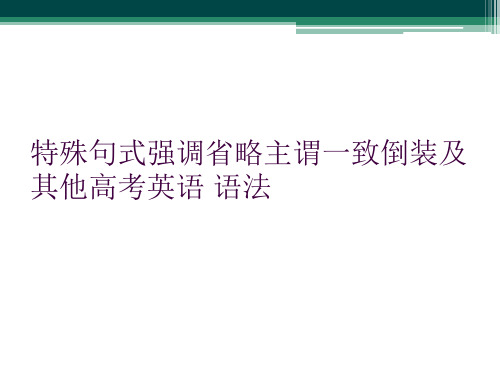
特殊句式强调省略主谓一致倒装及 其他高考英语 语法
特殊句式(强调、省略、主谓一致、 倒装及其他)
1.强调句的基本句型是“It is/was+被强调的部分+that/who+ 其他部分”。被强调的部分可以是主语、宾语和状语等。
It is only children who make such stupid mistakes. 只有孩子才会犯这样愚蠢的错误。 (2009·浙江卷)—I’ve read another book this week. ——这星期我又看了一本书。 —Well,maybe it is not how much you read but what you read that counts. ——嗯,也许重要的不是你看了多少而是你看了什么。 It was because her mother was ill that she didn’t come to school yesterday.是因为她妈妈病了,她昨天才没来上学的。
Sunday.
A.which
B.that
C.where
D.there
解析: 该题考查句式。该题实际考查的是定语从句,修饰先行词
supermarket。很多考生可能会误认为是强调句。
外研版高中英语必修四倒装、强调、省略以及虚拟语气

高中英语学习材料(灿若寒星*制作整理)倒装、强调、省略以及虚拟语气一、根据汉语完成句子。
1. 如果有人给我那个机会,我就不会让它溜走。
If I the chance, I let it go.2. 如果你投入更多的时间学习,你就不会考不及格了。
If you more time to your lessons, you the exam.3. 如果我明天有空的话,我会给花园里的花浇浇水。
If I free tomorrow, I the flowers in my garden.4. 如果那个男孩早点被送到医院,他可能会被救活。
If the boy to the hospital earlier, he brought back to life.5. 别跟着我,不然的话,我就打110了。
Don’t follow me. Otherwise, I 110.6. 我多么希望我能够拿出更多的钱帮助得了重病的西尔斯啊!How I wish I more money to help Sears, who is suffering a serious disease.7. 人们强烈建议尽快加宽这条路。
It is strongly suggested that the road as soon as possible.8. 经理要求我们时刻保持微笑。
The manager demands that we smiling all the time.9. 没有你的理解和支持,我就执行不了那个计划了。
I the plan without your understanding and support.10. 我们早就该认真讨论一下这个问题了。
It is high time that we the problem carefully.二、按要求把下列句子变化成强调句型。
1. Clinton graduated from Cambridge and has become a famous lawyer.(强调主语)2. John chose teaching as his lifelong career.(强调宾语)3. I happened to find the letter in a box when I was looking for my watch.(强调地点状语)4. I can’t attend your wedding party because I will be on duty that day.(强调原因状语)5. I envy them their youth and strength.(强调谓语)6. He didn’t get relaxed until everything settled d own.(not until的强调句式)三、把下列句子改写为倒装句。
高考倒装省略强调等用法
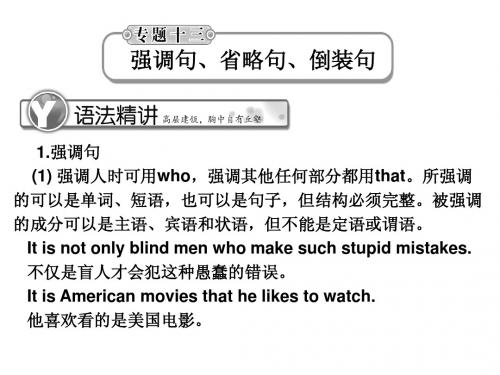
(4) 在so/such ...that引导的结果状语从句中,so或such引导的部 分置于句首时主句用倒装。 So shallow is the lake that no fish can live in it. 湖水那么浅,以致于没有鱼能在里面生存。 Such a good boy is he that we all love him. 他是那么好的一个孩子,我们都喜欢他。 另外,“so/neither/nor+be/助动词/情态动词+主语”so与前面 的肯定句呼应,neither/nor与前面的否定句呼应。其中动词的形式 取决于前一句的动词。表示前者的情况也(不)适用于后者或一者 (不)具备两种情况。 After that we never saw her again,nor did we hear from her. 从那以后我们再也没见过她,也没有收到过她的信件。 I saw the film last week.So did she. 上周我看了这部电影,她也看了。 (5) 省略if的虚拟条件句以had/were/should开头引起的倒装。 Were she my friend, I would ask her for help. 如果她是我的朋友,我就会请她帮忙。
3.倒装句 (1) 表示否定意义或半否定意义的词置于句首时,常用部分倒装。 常见的词有:seldom, never, hardly, no, not, little等。 Little did he know that the police were around. 他一点儿也不知道警察就在旁边。 Never before has our country been as united as it is. 现在我们的国家空前团结。 (2) 由only,not until引导的状语置于句首时,常用部分倒装。 Only by working hard can we succeed. 只有努力工作,我们才能取得成功。 (3) no sooner ...than, hardly ...when等结构中,no sooner 和hardly置于句首时,主句用倒装形式。 No sooner had he arrived home, he began to prepare the supper.他一到家就开始准备晚饭。 Hardly had he entered the room, it began to rain. 他一进屋就开始下雨了。
会考复习——倒装句、强调句、省略句
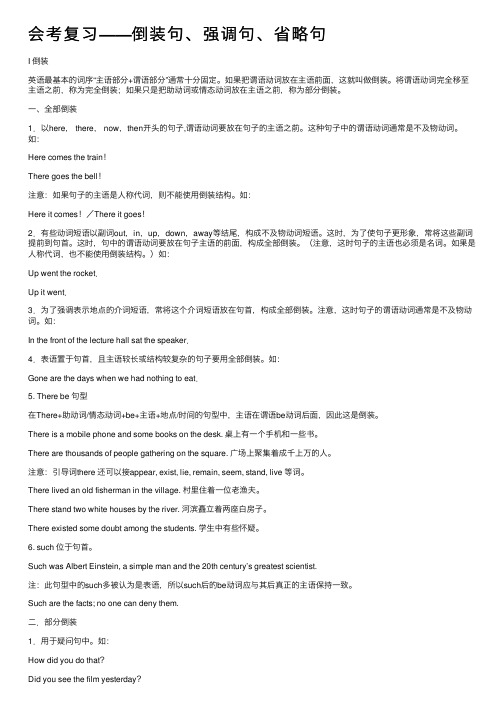
会考复习——倒装句、强调句、省略句I 倒装英语最基本的词序“主语部分+谓语部分”通常⼗分固定。
如果把谓语动词放在主语前⾯,这就叫做倒装。
将谓语动词完全移⾄主语之前,称为完全倒装;如果只是把助动词或情态动词放在主语之前,称为部分倒装。
⼀、全部倒装1.以here, there, now,then开头的句⼦,谓语动词要放在句⼦的主语之前。
这种句⼦中的谓语动词通常是不及物动词。
如:Here comes the train!There goes the bell!注意:如果句⼦的主语是⼈称代词,则不能使⽤倒装结构。
如:Here it comes!/There it goes!2.有些动词短语以副词out,in,up,down,away等结尾,构成不及物动词短语。
这时,为了使句⼦更形象,常将这些副词提前到句⾸。
这时,句中的谓语动词要放在句⼦主语的前⾯,构成全部倒装。
(注意,这时句⼦的主语也必须是名词。
如果是⼈称代词,也不能使⽤倒装结构。
)如:Up went the rocket.Up it went.3.为了强调表⽰地点的介词短语,常将这个介词短语放在句⾸,构成全部倒装。
注意,这时句⼦的谓语动词通常是不及物动词。
如:In the front of the lecture hall sat the speaker.4.表语置于句⾸,且主语较长或结构较复杂的句⼦要⽤全部倒装。
如:Gone are the days when we had nothing to eat.5. There be 句型在There+助动词/情态动词+be+主语+地点/时间的句型中,主语在谓语be动词后⾯,因此这是倒装。
There is a mobile phone and some books on the desk. 桌上有⼀个⼿机和⼀些书。
There are thousands of people gathering on the square. ⼴场上聚集着成千上万的⼈。
虚拟语气、强调句、倒装句

高考英语之虚拟语气归纳整理 - 高考英语之虚拟语气归纳整理虚拟语气是谓语动词的一种特殊形式,用来表达假设、主观愿望、猜测、建议、可能或空想等非真实情况。
如:He is honest. 他很诚实。
(陈述语气)Don‘t be late next time. 下次别迟到。
(祈使语气)If I were you ,I would not go. 我要是你,我就不会去。
(虚拟语气)I wish I had a lot of money. 要是我有很多很多钱就好了。
(虚拟语气)高考英语之虚拟语气归纳整理 - 第一类虚拟语气在条件句中的用法:条件句有真实条件句和虚拟条件句两种。
真实条件句所表示的假设是有可能发生的,此时主句不用虚拟语气;而虚拟条件句则表示一种假想,与事实相反或不大可能会发生,此时用虚拟语气。
如:If I have time,I will go. 假若我有时间,我就去。
(陈述语气)If I were yo u,I would go. 假若我是你,我就去。
(虚拟语气)时态类型主句谓语形式条件句的谓语形式例句与现在事实相反would/should/could/might+ V原动词过去式did*be 多用were1. If I were you, I shouldstudy English.2. I would certainly go if Ihad time.与过去事实相反would/should/could/might +have done动词过去完成式haddone1. If you had taken myadvice, you would not havefailed in the test.2. If I had left a littleearlier, I would have caughtthe train.与将来事实相反would/should/could/might + ①动词过去式1.If you came tomorrow, wewould have the mee ting. ①V原②should +V原③were+ to do 2. If it were to rain tomorrow, the meeting would be put off.③*规律总结:从句都往过去推一个时态,如:与现在相反的if从句就用过去时;与过去相反用过去完成时(即过去的过去)注:特别说明1、l would/should/could/might主句谓语中的should主要用于第一人称后;would表示结果还表示过去经常常常做某事,might表示可能性,could表示能力、允许或可能性。
2024年新高考版英语主谓一致、虚拟语气、省略、倒装、强调讲解部分

“a number of+复数名词”作主 A number of other plants were
语时,谓语动词用复数形式,意为 found in America.在美洲还发现
“许多……”;“the number of+ 了许多其他的植物。
复数名词”作主语时,谓语动词 The number of people who travel
复合不定代词someone、anyone、everyone、nobody/no one、something、anything、everything、nothing等作主语时,谓语动词用单数
If anyone sees Lisa, ask her to call me.如果有人看 到莉萨,请她给我打个电话。 Nothing is impossible to a willing heart.世上无难 事,只怕有心人。
If he shouldn't come tomorrow, we would put off the meeting.如果他 明天不来,我们就推迟 这个会议。
使用“(should+)动词原形”的虚拟语气 1.用于宾语从句 以下动词后的宾语从句常常使用虚拟语气,即谓语为“(should+)动词原 形”。
原则
意义 一致
课标必备点梳理
常见用法
例句
当“几分之几/百分之几/half/ the rest/most+of+名词”结构作 主语时,一般根据of后的名词的 单复数决定谓语动词的单复数
20% of the people in the city object to the price of running water going up. 这个城市中百分之二十的人反 对自来水价格上调。
虚拟语气,倒装,强调句,固定搭配

exercises
1.The victim _____________________ (本来有机会活下来) if he had been taken to hospital in time. would have had a chance to survive 2. You would not have failed if you (按照我的指令去做)________________ had followed my instructions/orders
The mad man was put in the soft-padded cell lest he (伤害自己) _________ (1998.1) 答案:injure himself
89.You’d better take a sweater with you___________________________________ __________ (以防天气变冷)
动词:decide, demand, insist, move(提议), order, propose, recommend, request, require, suggest, vote等。
He ordered that all the books be sent at once. We propose that somebody neutral take the chair(担任主席).
表示建议主张命令等概念的词语后的虚拟语气表示建议主张命令等概念的词语后的虚拟语气有些词语由于本身隐含说话人的主观愿望所以后面接的主语从句宾语从句同位语从句的谓语动词往往用shoulddo的形式且should表示这种概念的词语表示这种概念的词语动词名词形容词从句中的谓语动词用shoulddo或者shoulddone的形式且should常省略
15 特殊句式(倒装、省略、强调)
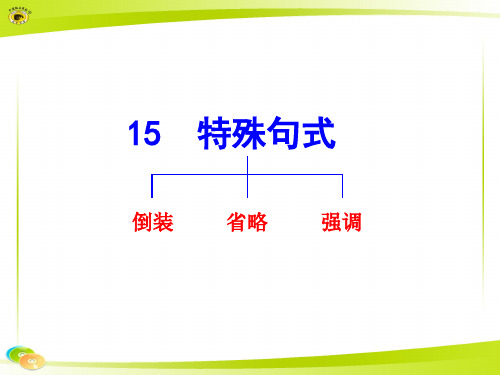
2) Should I earn money, I should live better.
3. so, as, neither, nor, no more 表示前面的情况也适合于另一人 或物时。(部分倒装)
1) Tom can speak French. So can Jack.
并列句中的省略
1.在后一并列分句中凡是与上下文相同的成分通常都要省略。 My office was on the tenth floor, and his (office was) on the twelfth (floor). 并列句的省略有时还可出现在前面的分句中,这时被省略的词
语便出现在下文。
省 略 ellipsis
省 略
定义 为了避免重复,突出关键词语,并使上下文紧密连接,在 句子中有时就省去了一个或几个句子成分。这种语法手段就称 为省略。省略是重要的修辞原则,因此,只要不损害语法结构, 不产生歧异,能省略的就应省略。
简单句中的省略
1.省略主语 祈使句中主语通常省略;其它省略主语多限于少数现成的说法。 (1) (I) Thank you for your help. (2) (It) Doesn’t matter. 2.省略主谓或主谓语的一部分 What/How (do you think) about a cup of tea ?
—Yes, I’d like to (go there).
注意:在下列词后常省略不定式但要保留to: want, wish, like,
hate, hope, intend, plan, love, refuse, expect,但当want 和like
用于从句中时,to常常省略。
英语中的倒装、强调和省略
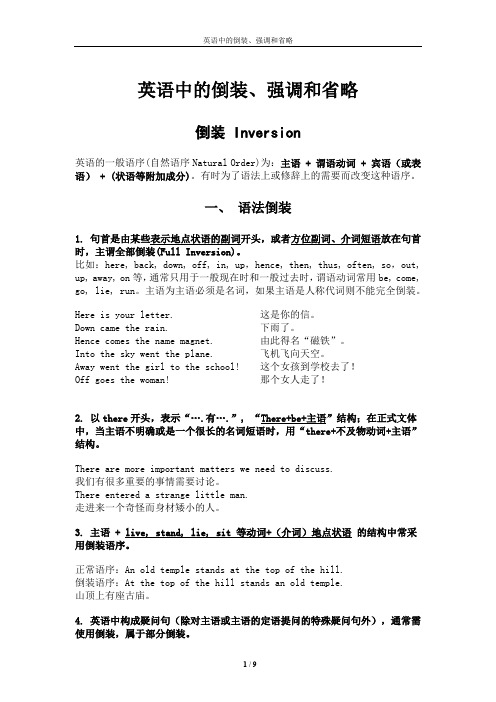
英语中的倒装、强调和省略倒装 Inversion英语的一般语序(自然语序Natural Order)为:主语 + 谓语动词 + 宾语(或表语) + (状语等附加成分)。
有时为了语法上或修辞上的需要而改变这种语序。
一、语法倒装1. 句首是由某些表示地点状语的副词开头,或者方位副词、介词短语放在句首时,主谓全部倒装(Full Inversion)。
比如:here, back, down, off, in, up,hence, then, thus, often, so,out, up, away, on等,通常只用于一般现在时和一般过去时,谓语动词常用be, come, go, lie, run。
主语为主语必须是名词,如果主语是人称代词则不能完全倒装。
Here is your letter. 这是你的信。
Down came the rain. 下雨了。
Hence comes the name magnet. 由此得名“磁铁”。
Into the sky went the plane. 飞机飞向天空。
Away went the girl to the school! 这个女孩到学校去了!Off goes the woman! 那个女人走了!2. 以there开头,表示“….有….”, “There+be+主语”结构;在正式文体中,当主语不明确或是一个很长的名词短语时,用“there+不及物动词+主语”结构。
There are more important matters we need to discuss.我们有很多重要的事情需要讨论。
There entered a strange little man.走进来一个奇怪而身材矮小的人。
3. 主语 + live, stand, lie, sit 等动词+(介词)地点状语的结构中常采用倒装语序。
正常语序:An old temple stands at the top of the hill.倒装语序:At the top of the hill stands an old temple.山顶上有座古庙。
虚拟,强调,省略,倒装

虚拟语气一、非真实条件句1.虚拟语气可以表示过去,现在和将来的情况,时态的基本特点是时态往后推移。
2.虚拟语气表时间从句主句例句与现在事实相反的假设一般过去时(be用were)would/shoud/could/might/oughtto+动词原形1.If they were here, theywould help you.2.If we had enough money,we would buy a computer.3.If I were you, I wouldn‟t do it.4.If it rained, we‟d stay athome.5.It would be odd if she wereawarded the first prize.时间从句主句例句与过去事实相反的假设过去完成时would/should/could/might+havedone1.If he had come yesterday, I would have toldhim about it.2.If I had been in her position, I‟d have quit.3.If the weather hadn‟t been so bad, we mighthave gone out.4.If he had apologized, you should have doneso too.对将来不大可能发生的事情的假想一般过去时would/should/could/might/ought to+动词原形1.If you succeeded, everything would be allright.2.If they invited me, I would certainly attend it.3.If he went, would you go too?与将来事实相反的假设were+不定式would/should/could/might/ought to+动词原形1.If she were to lose her place, they would beruined.2.If you were to speak to him, it would carrymore weight.二、混合条件句(错综时间条件句)有时,主句与从句的动作发生在不同的时间,主句和从句谓语动词的虚拟语气形式因时间不同而不同,这种条件句叫作混合条件句。
倒装,强调,省略

2. It was only when the car pulled up in
front of our house ______ we saw Lily in
the passenger seat. (2018天津)Fra bibliotekA. which
B. that
C. when
D. where
3. It was when I got back to my apartment
3) 为了强调状语,可将状语置于句首,这时句子 用完全倒装语序。如:
By the window sat a boy with a magazine in his hand.
为了使语言简洁,人们常把某些词省 略掉。被省略的部分可能是主语、主语和 谓语、谓语或谓语的一部分、宾语等。有 时句子的大部分都会被省略。常见的省略 情况有:
子成分。 否定形式: It isn't / wasn't +被强调部分+ that .... 一般疑问句形式: Is / Was it + 被强调部分+that ...? 特殊疑问句形式: 疑问词+ is / was it that ...?
2) not ... until ... 的强调句形式为It is / was not until ... that ...。
Once there lived an old fisherman in a village by the sea. 3) here, there, now, then, out, in, up, down, off, away等副词位于句首,主语为名词, 谓语动词通常是be, come, go, run, rush, fly, follow, fall等词,时态为一般时。如:
倒装及强调和省略句

从句
主语为it且从句谓语中有 ②Though (they were)
虚拟 语气
在虚拟条件句中, 如含有 略, 句子要用倒装
had, were, should, if可省 twenty now, I would
种类
要点归纳
典句例示
动 词 不 定 式
感官动词或使役动词(如 feel, see, hear, notice, let, I heard someone 不 make, have等)后接不定 sing in the next 定 式作宾语补足语时省略 room. 式 to 符 号 ①He did nothing 在do nothing but, can’t to but wait all the time. help but, why not, would 的 ②Rather than ride rather. . . than. . . ; prefer 省 on a crowded bus, to do. . . rather than. . . 略 he always prefers to 等句型中省略to ride a bicycle.
No sooner…than… Hardly/scarcely/barely…when… e.g. No sooner had he closed his eyes _____ than the doorbell rang.(2002) when Hardly had he sat down _____the phone rang.(2010)
If I were to do it, I’d do it some other way.
Were I to do it, I’d do it some other way. If you had been here earlier, you would have seen him.
倒装句口诀
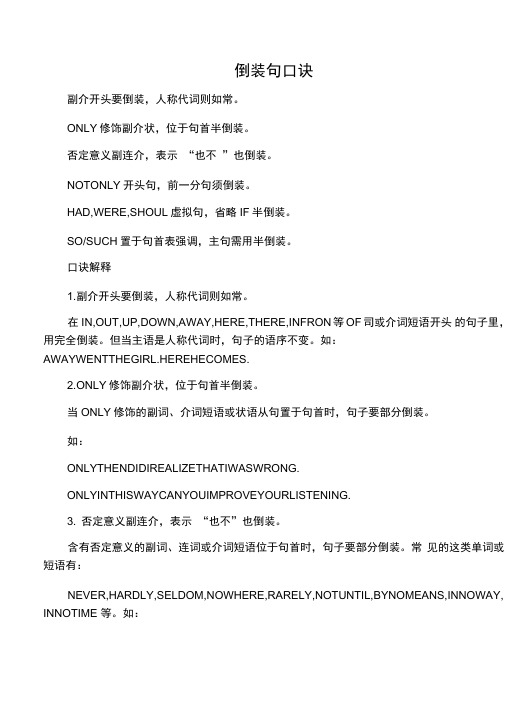
倒装句口诀副介开头要倒装,人称代词则如常。
ONLY修饰副介状,位于句首半倒装。
否定意义副连介,表示“也不”也倒装。
NOTONLY开头句,前一分句须倒装。
HAD,WERE,SHOUL虚拟句,省略IF半倒装。
SO/SUCH置于句首表强调,主句需用半倒装。
口诀解释1.副介开头要倒装,人称代词则如常。
在IN,OUT,UP,DOWN,AWAY,HERE,THERE,INFRON等OF司或介词短语开头的句子里,用完全倒装。
但当主语是人称代词时,句子的语序不变。
如:AWAYWENTTHEGIRL.HEREHECOMES.2.ONLY修饰副介状,位于句首半倒装。
当ONLY修饰的副词、介词短语或状语从句置于句首时,句子要部分倒装。
如:ONLYTHENDIDIREALIZETHATIWASWRONG.ONLYINTHISWAYCANYOUIMPROVEYOURLISTENING.3. 否定意义副连介,表示“也不”也倒装。
含有否定意义的副词、连词或介词短语位于句首时,句子要部分倒装。
常见的这类单词或短语有:NEVER,HARDLY,SELDOM,NOWHERE,RARELY,NOTUNTIL,BYNOMEANS,INNOWAY, INNOTIME 等。
如:NOTUNTILYOU VEDONEYOURHOMEWORKCANYOUPLAYNOW.NEITH位R,NOR于句首表示前面否定的内容也适用于另一人或物时,句子须用倒装,其结构为“ NEITHER/NOR+BE动词/情态动词+主语”女口:HEDOESN'TLIKEBEETHOVENANDNEITHERDOI.4. NOTONLY开头句,前一分句须倒装。
NOTONL Y---BUT(ALSO)连接两个分句时,若NOTONLY位于句首,前一个分句用部分倒装结构。
如:NOTONL YDIDIPA YOFFALLM YDEBTS,BUTISTILLSAVEDSOMEMONE Y.5. HAD,WERE,SHOUL虚拟句,省略IF半倒装。
张铁云谈倒装、强调、虚拟

倒装专题1.倒装的起源在英语中,主语常在谓语的前面,但是,有时由于语法上或者修辞上的需要,将谓语的一部分或全部提到了主语的前面,这样的句子就叫做倒装句。
2.倒装句分为完全倒装(即全倒装)和部分倒装(半倒装)。
3.具体详解全倒装全倒装:将句子中的整个谓语完全移到主语前面,即谓语动词完全置于主语之前的句子。
条件:表示方式或方位的副词或介词短语,如there,here,now,then,up,down,in,away,off,out,in the room,on the wall等结构:条件+谓语动词部分+主语+其他In front of the house lies a small factory. =A small factory lies in front of the house. There goes the bell. =The bell goes thereHere comes the bus. =The bus comes here链接考研:In the picture above is a large hot pot.注意:①此种结构的谓语动词大多为不及物动词,只有当主语是名词时,才能采用倒装结构;如果主语指人称代词时,不需要倒装结构。
In he came and the meeting began.②谓语动词的单复数与其后的主语保持一致,不受前面介词短语中的名词形式的制约。
In front of the building stand some tall trees.半倒装半倒装:仅把助动词、系动词或情态动词移到主语的前面,不是将谓语部分全部移主语之前,只是将谓语的部分置于主语之前。
结构:条件+情/助/be+主语+V条件:1.否定副词或表示否定意义的词组:never,hardly,seldom,little,no,not,rarely,few,nowhere,at no time,by no meansNever in my wildest dreams could I imagine these people are living in such poor conditions.At no time is smoking permitted in the library!2.only+状语Only in this way can we learn English well.Only if you eat the correct foods will you be able to keep fit and stay healthy.注意:①only修饰主语时,不能使用倒装,要保持正常语序。
特殊句式(强调、倒装、省略及其他)

解析:考查完全倒装。副词there,here等位于句首,应用 完全倒装句式。句意:约翰打开门,他从来没见过的一位 女孩站在那儿。
答案: D
2.(2010· 江西高考)Not until he left his home ________ to
know how important the family was for him.
The computer was used in teaching.As a result,not
only was teachers' energy saved,but students became more interested in the lessons.(2009· 全国卷Ⅰ)
电脑被应用于教学中,结果,不仅节省了老师的精力,
你是昨天在大街上碰到你老师的吗?
Who was it that told you such a thing? 究竟是谁告诉你这么件事的? Why was it that you didn't come to the meeting yesterday? 究竟是为什么你昨天没有来开会?
I just wonder what it is that makes him so excited.(山东高考)
(5)表语、状语或动词原形+as/though+主语+其他 时,句子要倒装 Much as I like it,I'll not buy it. 尽管我很喜欢它,但我不会买。
Pretty as she is,she is not proud.
尽管她很漂亮,但她一点也不自负。 Try as he would,he might fail again. 尽管他还会试,但可能还会失败。
倒装语法典型改写
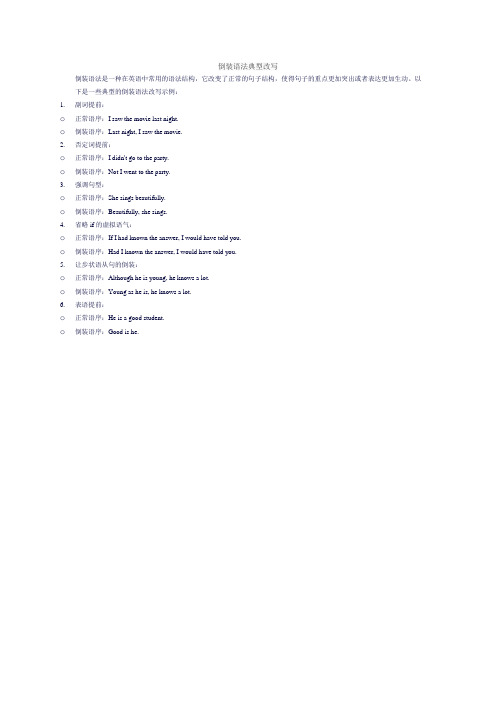
倒装语法典型改写
倒装语法是一种在英语中常用的语法结构,它改变了正常的句子结构,使得句子的重点更加突出或者表达更加生动。
以下是一些典型的倒装语法改写示例:
1.副词提前:
o正常语序:I saw the movie last night.
o倒装语序:Last night, I saw the movie.
2.否定词提前:
o正常语序:I didn't go to the party.
o倒装语序:Not I went to the party.
3.强调句型:
o正常语序:She sings beautifully.
o倒装语序:Beautifully, she sings.
4.省略if的虚拟语气:
o正常语序:If I had known the answer, I would have told you.
o倒装语序:Had I known the answer, I would have told you.
5.让步状语从句的倒装:
o正常语序:Although he is young, he knows a lot.
o倒装语序:Young as he is, he knows a lot.
6.表语提前:
o正常语序:He is a good student.
o倒装语序:Good is he.。
高考省略、倒装和强调必备

camera?)
2) ---Who can do it ? ---Lucy,Ithink .( Lucy can doit,IThink.) 3)Which country did you go to last summer ? --Britain. ( I went to Britain last summer
want to (dance with her).
--Will you go with me? --Well, I’d like to (go with you).
b. 在have to, need, ought to, be going to, used to等后省略动词. 如: I really didn’t want to go there with him, but I had to (go there with him). c在某些形容词delighted, glad, happy, pleased等
4)连词when/while/though+现在分词
While (I was )walking in the street, I heard my name
called .
5).连词when/if/even if/unless/once/until/than/as+过去
分词 The exhibition is more interesting than( it was) expected. 6).连词as if/as though +不定式 He opened his lips as if (he were) to speak.
it is it is
6) Henry stopped walking as if to wait for
教资-英语-句法(特殊句式:虚拟、强调、省略、倒装、独立主格)

教资-英语-句法-特殊句式--(虚拟、倒装、强调、省略、独立主格)【说在课前】今天晚上学习虚拟语气。
【解析】1.句法的第 1-3 节课讲完了三大从句。
后面句法的第 4-6 节课会讲特殊句式,即虚拟语气、倒装句、强调句、省略句和独立主格。
今天晚上学习虚拟语气。
2.明天全天没有课程,大家可以把前三节课学习的三大从句和今天晚上学习的虚拟语气好好梳理一下。
一、虚拟语气What is subjunctive mood?虚拟语气用来表示说话人的主观愿望或假想,而不表示客观存在的事实。
虚拟语气通过谓语动词的特殊形式来表示。
【解析】虚拟语气:1.表示说话人的主观愿望或假想,不表示客观存在的事实。
我们讲话的时候还有一种情况,比如我中了五百万我就买一辆劳斯莱斯;我要是一个男人的话,我会……,中五百万和我要是个男人,这个事情还是有可能发生的,只是发生几率很低,也会用虚拟语气,所以小概率的事件也会用虚拟语气。
2.虚拟语气就是通过对谓语动词进行特定的变形体现的。
比如谓语动词do,可以变成does, did, doing, done。
考试着重考的是谓语动词的变化形式。
考点:动词形式虚拟语气1.与if 相关2.与愿望、建议、要求、命令等相关3.“要是……就好了/好像”4.It's (high/about) time+从句5.虚拟语气的其他形式【解析】前两个是重点,会有一些变化;后面三个没有什么理解难度,比较固定,老师也会带着大家梳理一下。
1.与if 相关。
2.与愿望、建议、要求、命令等相关。
3.“要是……就好了/好像”。
4.It's (high/about) time+从句。
5.虚拟语气的其他形式。
1.与if 相关if 引导的条件状语从句错综时间条件句省略if代替if【解析】与if 相关:下面有四个小考点。
1.i f 引导的条件状语从句。
今天上午有提到if 引导的条件状语从句,但没有提到虚拟语气。
2.错综时间条件句。
高中英语语法系统讲解之十三省略、倒装和强调
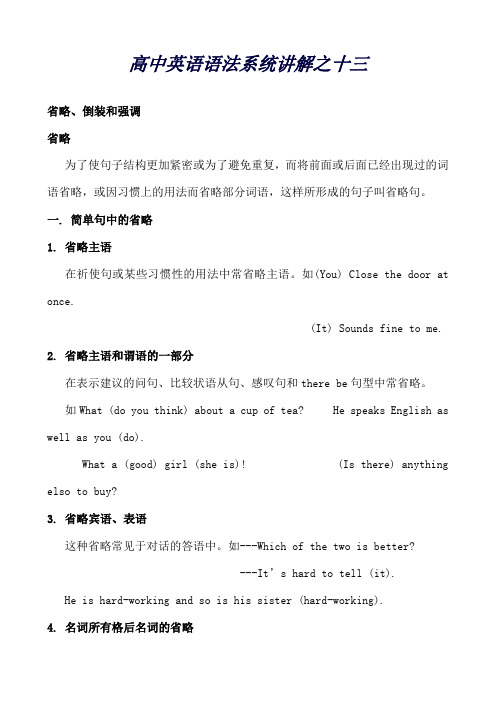
高中英语语法系统讲解之十三省略、倒装和强调省略为了使句子结构更加紧密或为了避免重复,而将前面或后面已经出现过的词语省略,或因习惯上的用法而省略部分词语,这样所形成的句子叫省略句。
一. 简单句中的省略1. 省略主语在祈使句或某些习惯性的用法中常省略主语。
如(You) Close the door at once.(It) Sounds fine to me.2. 省略主语和谓语的一部分在表示建议的问句、比较状语从句、感叹句和there be句型中常省略。
如What (do you think) about a cup of tea? He speaks English as well as you (do).What a (good) girl (she is)! (Is there) anything elso to buy?3. 省略宾语、表语这种省略常见于对话的答语中。
如---Which of the two is better?---It’s hard to tell (it).He is hard-working and so is his sister (hard-working).4. 名词所有格后名词的省略名词所有格修饰的名词有上下文已出现或表示店铺、住宅、教堂等地点时常省略。
如These are John’s books and those are Mary’s (books).At her mother’s (house) she passed many happy days.5. 冠词的省略在某些固定短语the next day(morning,week,year …)中,有时为了使语气紧凑,定冠词the常可以省略;在副词的最高级前面定冠词常可以省略;另外在某些独立结构中和as引导的让步状语从句中,常可省略冠词。
如We went to the farm to help the farmers with the harvest (the) next day.He sings (the) best in the class. Child as she is, she knowsa lot.6. 介词的省略一些动词搭配构成的短语,如prevent / stop sb(from)doing,have trouble / difficulty/ problems(in)doing,spend time(in)doing等中的介词常可以省略。
- 1、下载文档前请自行甄别文档内容的完整性,平台不提供额外的编辑、内容补充、找答案等附加服务。
- 2、"仅部分预览"的文档,不可在线预览部分如存在完整性等问题,可反馈申请退款(可完整预览的文档不适用该条件!)。
- 3、如文档侵犯您的权益,请联系客服反馈,我们会尽快为您处理(人工客服工作时间:9:00-18:30)。
过去 完成 时
would/shoul d/could/mig ht+have done would/ should/ could/ might/ ought to+动 词原形 would/ should/ could/might/ ought to+动 词原形
对将来 不大可 一般 能发生 过去 的事情 时 的假想 与将来 事实相 were 反的假 +不 定式 设
从句
主句
时间 与过 去事 实相 反的 假设
从句
主句
例句 1.If he had come yesterday, I would have told him about it. 2.If I had been in her position, I‟d have quit. 3.If the weather hadn‟t been so bad, we might have gone out. 4.If he had apologized, you should have done so too. 1.If you succeeded, everything would be all right. 2.If they invited me, I would certainly attend it. 3.If he went, would you go too?
3. wish的用法 (1)wish后面的从句,表示与事实相反的情况,或表示将来 不太可能实现的愿望时,其宾语从句的动词形式为:
情况 主句 从句
从句动作先于主句动词动作
现在时
过去时
从句动作与主句动作同时发生 过去时/现在 过去完成时 时 Would 将来不大可能实现的愿望 将来时/现在 /could +动 时 词原形
2.虚拟语气用在方式状语从句中 在as if (as though)引导的方式状语从句中,常用虚拟 语气,表示“似乎,好像”的意思,其动词形式与wish后 接宾语从句中的形式相同。 He talks about pyramids as though he had seen them himself. 他谈起金字塔来,就好像亲眼见到过似的。 I feel as if we had known each other for years. 我感觉我们好像已经认识好多年了。 It looks as if it might rain. 看上去好像要下雨了。
四、虚拟语气在宾语从句中的运用 1.虚拟语气用在would rather,would(just)as soon, would sooner,would prefer(希望)等后接的宾语从句 中。 表示某人宁愿让另一个人做某事,其后的宾语从句的谓语动 词需用虚拟语气。若表示现在或将来要做某事,从句谓语动 词需用一般过去时;表示过去已经做的事,从句谓语动词用 过去完成时。 The manager would rather his daughter did not work in the same office. 经理宁愿她女儿不与他在同一间办公室工作。 Wouldn‟t you rather your child went to bed early? 你不愿让你的孩子早点上床吗?
三、含蓄条件句:是指非真实条件句中的条件从句 有时不表示出来,只暗含在上下文中。含蓄条件句常 见的表达方式有:
1.定语从句和状语从句 Anyone who had married such a girl as she would have been regretful. 谁娶了像她这样的姑娘都会后悔的。 Help was promised where it should become necessary. 要是需要的话就答应给予帮助。
4.通过分词短语表示条件 Given more time, we could have done it better. 如果多给一点时间,我们会做得更好的。 Legalizing this drug would have disastrous consequence. 使毒品合法化会有灾难性的后果。 5.用动词不定式表示条件 It would be a mistake not to help him. 没有帮助他是个错误。 She would have done anything to make amends. 她会做任何事来弥补。
【点拨】 ①若某人宁愿自己做某事,would rather后用动词原形。 I would rather stay at home today.
我今天宁愿待在家里。
I would rather stay at home than go out today. 我今天宁愿待在家里也不愿出去。
2.在表示命令、建议、要求等动词后面的从句中,像order, suggest, propose, require, demand, request, insist, command, insist+(should) do。 I suggest that we (should) hold a meeting next week. 我建议下周召开个会议。 He insisted that he (should ) be sent there. 他要求被派到那儿去。 【点拨】 如果suggest, insist不表示“建议” 或“坚持要某人做某 事”时,即它们用于其本意“暗示,表明”、“坚持认为” 时,宾语从句用陈述语气。 (错) Your pale face suggests that you (should)be ill. (对) Your pale face suggests that you are ill. (错) I insisted that you (should)be wrong. (对) I insisted that you were wrong.
3.连词otherwise, or, but He would have given you more help, but he has been so busy. 他本来可以多给你一些帮助的,只是他太忙了。 Seize the chance, otherwise you would regret it. 如果不抓住这个机会,你会后悔的。 He felt very tired yesterday, or he would have helped you. 他昨天觉得太累了,不然他会帮你的。
虚拟语气
一、非真实条件句
1.虚拟语气可以表示过去,现在和将来的情况,时态的基本特点是时 态往后推移。 2.虚拟语气表
时间
与现 在事 实相 反的 假设
例句 1.If they were here, they would help you. 2.If we had enough money, we would buy a computer. 一般过 would/shou 去时 d/could/mig 3.If I were you, I wouldn‟t do it. 4.If it rained, we‟d stay at ( be ht/ought to+动词原形 home. 用 were) 5.It would be odd if she were awarded the first prize.
六、虚拟语气在其他状语从句中的使用
1. 虚拟语气用在目的状语从句中 在由lest, for fear that, in order that, so that, in case等引 导的目的状语从句中需用虚拟语气,表示“以防,以免”等 意思,其谓语动词多由“should/could/might+动词原形” 构成,should也可以省略。 He was punished lest he should make the same mistake again. 他被处以惩罚以免他再犯同样的错误。 I will not make a noise for fear that I should disturb him. 我不会出声的,以免打扰他。 He put his coat over his son in case he should catch cold. 他把大衣盖在儿子身上以免他着凉。 注意:如果 in order that 和 so that 前的主句是现在时,其 后的从句有时也可用“can/may+动词原形”。
2.介词及介词短语:but that, but for, without, with, under, under ...condition, supposing, suppose, on condition that, in the past等。 Without your help, I couldnt have achieved all this. 要不是有你帮助,我不会取得这些成就。 But for the fog we would have reached our destination long ago. 要是没有雾的话,我们很早就到 目的地了。 Under more favourable conditions we could have finished the task. 如果条件对我们更有利,我们就会把工作完成得更好了。
五、虚拟语气在表语从句或同位语从句中的运用
当某些表示建议、请求、命令等主观意向的名词作主语时, 其后的表语从句或同位语从句需用虚拟语气,其表达形式 为:should+动词原形或直接用动词原形。这类名词常见 的有:advice,suggestion,proposal,order, demand,desire,request,requirement, recommendation, aim, wish, necessity, preference, motion, plan,idea,resolution。 We are all for your proposal that the discussion be put off. 我们都赞成你提出的将讨论延期的建议。 The suggestion that the mayor present the prizes was accepted by everyone. 由市长颁奖的建议被每个人所接受。
